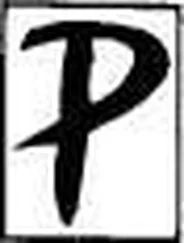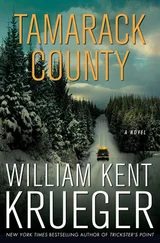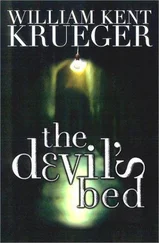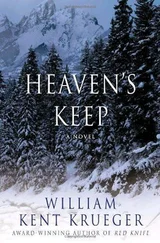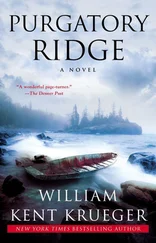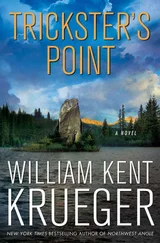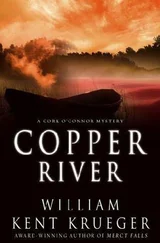William Krueger - Thunder Bay
Здесь есть возможность читать онлайн «William Krueger - Thunder Bay» весь текст электронной книги совершенно бесплатно (целиком полную версию без сокращений). В некоторых случаях можно слушать аудио, скачать через торрент в формате fb2 и присутствует краткое содержание. Жанр: Триллер, на английском языке. Описание произведения, (предисловие) а так же отзывы посетителей доступны на портале библиотеки ЛибКат.
- Название:Thunder Bay
- Автор:
- Жанр:
- Год:неизвестен
- ISBN:нет данных
- Рейтинг книги:4 / 5. Голосов: 1
-
Избранное:Добавить в избранное
- Отзывы:
-
Ваша оценка:
- 80
- 1
- 2
- 3
- 4
- 5
Thunder Bay: краткое содержание, описание и аннотация
Предлагаем к чтению аннотацию, описание, краткое содержание или предисловие (зависит от того, что написал сам автор книги «Thunder Bay»). Если вы не нашли необходимую информацию о книге — напишите в комментариях, мы постараемся отыскать её.
Thunder Bay — читать онлайн бесплатно полную книгу (весь текст) целиком
Ниже представлен текст книги, разбитый по страницам. Система сохранения места последней прочитанной страницы, позволяет с удобством читать онлайн бесплатно книгу «Thunder Bay», без необходимости каждый раз заново искать на чём Вы остановились. Поставьте закладку, и сможете в любой момент перейти на страницу, на которой закончили чтение.
Интервал:
Закладка:
The man had cold gray eyes. “Arms, please,” he said in a voice that told me he wasn’t amused.
I suffered another body check.
“You the one who gives out the hall passes?” I said when he’d finished.
He went back to his clipboard, made another brief notation. “Stick with him,” he advised me, pointing toward Morrissey, “and there won’t be any trouble.”
“This way, O’Connor,” Morrissey said.
He stepped off the dock onto a path of crushed limestone that disappeared into the trees cloaking the island.
ELEVEN
This is the forest primeval. The towering pines and the hemlocks bearded like druids of eld… something, something.
Longfellow, I think. Jenny would have been able to quote the whole damn thing. Me, I could barely remember the first couple of lines. Primeval was right, though. The trees grew close together, tall and, in this place, forbidding. They formed a dark roof over us and a wall around us. Green-black moss crept over everything-the pines, the rocks, the rotting, fallen tree trunks. It was cool but not so quiet. I heard dogs barking somewhere in the trees. The only other sounds were the crunch of limestone under our feet and the sizzle of Morrissey’s windbreaker as he swung his heavy arms.
He kept me in front of him.
“Just stick with the path,” he said.
Which didn’t follow a straight line, but wound through the trees so that periodically what was behind was as lost to me as what was ahead. After a few minutes, we walked into a large clearing. At the center stood a mansion built of stone. It was two stories with a couple of wings off the large center section. There was a portico with Greek-looking pillars, and on the second story each of the rooms had a balcony. Half a dozen chimneys pushed through the roof. I could see that gardens had brightened the grounds at one time, but now the plots were a tangle of wild undergrowth.
I’d learned from my Internet research that Manitou Island had been the family retreat. After his wife’s death, Wellington had sold his luxurious home in Thunder Bay and retired to the island permanently. In the past five years, he’d been seen publicly on only a handful of occasions, the last nearly two years before.
People were entitled to their privacy, but it also seemed that, like the banning of a book, the obsession with privacy increased the attraction of what could not be had.
The few relatively recent photos that I’d found on the Internet were of a robed figure, druidlike, among the trees of Manitou Island. The white wisp the woman at the marina had spoken of.
Morrissey’s hand on my back urged me forward.
“I don’t know what’s in that box,” he said as we mounted the steps to the lodge, “but it must be something. Mr. W. sees nobody, I mean nobody, from the outside anymore.”
He stepped ahead and opened the door, beckoning me to enter.
The moment I was inside I caught the smell of disinfectant or bleach. It pervaded the place. Not overwhelming, but everywhere. It was also uncomfortably warm and stuffy.
The common area we entered was a maze of stacked newspapers hip high, with a couple of narrow corridors running through it. Sheets covered the furniture, which had been pushed to the walls. Morrissey had pulled off his shades. He pointed toward the stairs beyond the clutter, and we maneuvered our way there. Upstairs, he directed me down a dark hallway to a door near the end of one of the wings. We entered a kind of anteroom. Morrissey went to another door and knocked.
“Who is it?”
“Morrissey, Mr. Wellington. I’ve got your visitor.”
“Show him in.”
Before we entered, Morrissey reached to a table beside the door and pulled a surgical mask from a small box there. He handed it to me. “Put this on.”
“You’re kidding.”
“You want to see Mr. W., you put on the mask.”
I took it, and as I tied it around my face, Morrissey did the same with another. In addition, he took a pair of latex examination gloves from another box on the table.
“Should I put on gloves?” I asked.
“You planning on touching anything?”
“Not intentionally.”
“See that you don’t.”
He opened the door and stepped in ahead of me.
The gloom of the hallway, of the whole place, hadn’t prepared me for what lay beyond that door. The room was claustrophobic, tiny for such a great house. Jammed into it were a bed neatly made and covered with a snow white comforter, an easy chair of smooth white leather, an enormous television with a fifty-two-inch screen, a rolling garment hanger hung with nothing but white robes, and, lining the walls, stack upon stack of unopened Kleenex tissue boxes. The room was dark except for a tall standing lamp of highly polished steel that cast a small circle of cold light down around the easy chair. The chair faced the television, so all I could see was its smooth white back.
The television was on, tuned to a station broadcasting the intimate, unpleasant details of a heart operation. I watched the heart pump away inside the open chest cavity, while several hands in bloody surgical gloves worked around it with scissors and clamps. Everything in the gaping wound glistened, wet and raw.
“Did you close the door?”
The voice came from the chair, the same voice I’d heard from the hallway. It was thin and a little peevish, like a bad clarinet.
“It’s closed,” Morrissey said.
The bloody hands on the television gripped the heart, and I was afraid maybe they were going to pull it out of the body.
The screen went black. I didn’t mind.
The chair swiveled slowly, bringing me face-to-face with Henry Wellington.
His hair was long and white, very much like Meloux’s. Although he wore a white robe, it was clear the fabric hung on a slender frame. His face, like mine and Morrissey’s, was half covered by a surgical mask. I tried to look into his eyes, to see if there was something of Meloux there, but his turning had put the lamp at his back and his face was deep in shadow.
“Bring me the box,” he said to Morrissey.
Like a good lackey, Morrissey stepped forward, took the little jewelry box from the pocket of his windbreaker, and, with his latex-covered hands, delivered it to Wellington. Then he retreated to the place where he’d stood before, just at my back.
Wellington fumbled with the watch. For an engineer, he seemed oddly stumped by how to open such a simple mechanism. Finally he succeeded in freeing the catch. For a minute, he studied the photograph inside.
“You have some story about the item and my mother?”
“It’s for your ears only,” I said.
“Leave us, Mr. Morrissey.”
“I’m not sure that’s such a good idea, Mr. Wellington,” Morrissey cautiously offered. “I think I should be here if you need me.”
A reasonable argument from a bodyguard, I thought. Whatever else I felt about Morrissey, he was a man who took his job seriously.
“I believe, Mr. Wellington, that what I have to say you won’t want anyone else to hear,” I countered.
“I’ll say it only once more, Mr. Morrissey. Leave us.” The reedy voice suddenly had volume and power, and I could tell that somewhere in all that withered white was a man with the ability to command, the kind of man I’d talked to on my cell phone earlier.
“Yes, sir,” Morrissey said.
I didn’t turn, but I heard the door open and close at my back.
The air was close and warm. I was sweating.
“The story,” Wellington said, holding up the watch so that it dangled at the end of its gold fob.
“That watch was given to me by an old man. He was given it by your mother. His name is Henry Meloux. He’s dying.”
I tried to pierce the shadow over his face, to see in that frail wizened face something of Meloux. The eyes were dark, but not Henry’s, I finally decided. More like the woman in the photograph, perhaps.
Читать дальшеИнтервал:
Закладка:
Похожие книги на «Thunder Bay»
Представляем Вашему вниманию похожие книги на «Thunder Bay» списком для выбора. Мы отобрали схожую по названию и смыслу литературу в надежде предоставить читателям больше вариантов отыскать новые, интересные, ещё непрочитанные произведения.
Обсуждение, отзывы о книге «Thunder Bay» и просто собственные мнения читателей. Оставьте ваши комментарии, напишите, что Вы думаете о произведении, его смысле или главных героях. Укажите что конкретно понравилось, а что нет, и почему Вы так считаете.

